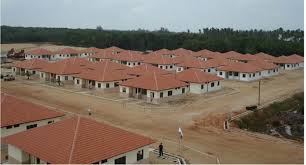In a significant move to address the housing deficit and improve the welfare of civil servants, the Delta State Government has approved the allocation of 10 hectares of land for the development of an affordable housing scheme specifically targeted at workers in the state. The announcement, made by the state’s Commissioner for Housing, Chief Godspower Asiuwhu, underscores the administration’s commitment to enhancing the living conditions of its workforce and fostering sustainable urban development. This initiative, which is part of a broader vision to provide accessible and affordable housing, has been hailed as a progressive step toward alleviating the housing challenges faced by workers in Delta State.
Background: The Housing Crisis in Nigeria
Nigeria, Africa’s most populous nation, has long grappled with a severe housing shortage, with estimates suggesting a deficit of over 20 million housing units nationwide. This crisis is particularly acute in urban centers, where rapid population growth, rural-urban migration, and rising costs of land and construction materials have made homeownership a distant dream for many. In Delta State, a key economic hub in Nigeria’s South-South region, the housing challenge is no less pronounced. The state’s capital, Asaba, and other major cities like Warri, Sapele, and Ughelli have seen increasing demand for affordable housing, driven by a growing workforce and expanding urban populations.
Civil servants, who form the backbone of the state’s administrative machinery, are among the worst affected by this housing deficit. Many workers in Delta State, particularly those in the lower and middle-income brackets, struggle to secure decent accommodation due to high rental costs and limited access to affordable housing schemes. The situation is compounded by the rising cost of living, stagnant wages, and the lack of structured mortgage systems tailored to the needs of low- and middle-income earners.
Recognizing these challenges, the administration of Governor Sheriff Oborevwori has prioritized housing as a key pillar of its developmental agenda. The allocation of 10 hectares for workers’ housing is a tangible manifestation of this commitment, signaling the government’s intent to bridge the housing gap and improve the quality of life for its employees.
Details of the Housing Initiative
According to Chief Godspower Asiuwhu, the 10-hectare land allocation is a strategic intervention aimed at providing affordable and decent homes for civil servants in Delta State. The land, which is yet to be publicly disclosed in terms of its exact location, is expected to be situated in a well-planned area with access to essential infrastructure such as roads, electricity, and water supply. The Commissioner emphasized that the project would be executed in collaboration with private developers and relevant stakeholders to ensure quality, affordability, and timely delivery.
The housing scheme is designed to cater to the needs of civil servants across various cadres, with a focus on affordability and accessibility. While specific details about the types of housing units—whether bungalows, semi-detached houses, or apartments—are yet to be finalized, the Commissioner assured that the project would incorporate modern designs and amenities to meet contemporary standards. The initiative also aligns with the state’s broader urban renewal and sustainable development goals, ensuring that the housing estate is environmentally friendly and conducive to community living.
Chief Asiuwhu further noted that the project would include provisions for flexible payment plans, such as mortgage schemes, to make homeownership attainable for workers. This approach is particularly significant in a country where access to long-term, low-interest mortgages remains a major barrier to homeownership. By partnering with financial institutions and developers, the Delta State Government aims to create a model that could be replicated in other parts of the state and beyond.
Governor Oborevwori’s Vision for Workers’ Welfare
The affordable housing scheme is a key component of Governor Sheriff Oborevwori’s MORE Agenda, an acronym for Meaningful Development, Opportunities for All, Realistic Reforms, and Enhanced Peace and Security. Since assuming office, Governor Oborevwori has emphasized the importance of improving the welfare of civil servants, whom he describes as the “engine room” of the state’s development. The housing initiative is one of several measures introduced by the administration to boost workers’ morale and productivity.
In addition to the housing scheme, the Oborevwori administration has implemented other worker-friendly policies, including timely payment of salaries, pension reforms, and capacity-building programs. These efforts are aimed at creating a motivated and efficient workforce capable of driving the state’s developmental objectives. The allocation of land for housing is seen as a bold step toward addressing one of the most pressing needs of civil servants, many of whom spend a significant portion of their income on rent.
Governor Oborevwori, in a statement delivered through the Commissioner, reiterated his administration’s commitment to ensuring that no worker is left behind in the quest for a better quality of life. “Our civil servants deserve to live in decent and affordable homes. This housing scheme is our way of showing appreciation for their hard work and dedication to the service of Delta State,” the Governor said.
Stakeholder Reactions and Expectations
The announcement of the 10-hectare land allocation has generated positive reactions from various stakeholders, including civil servants, labor unions, and housing experts. The Delta State Chapter of the Nigeria Labour Congress (NLC) commended the government for its foresight and commitment to workers’ welfare. The NLC Chairman, Comrade Goodluck Ofobruku, described the initiative as a “game-changer” that would alleviate the financial burden of housing for workers.
“This is a commendable move by the Delta State Government. For too long, our members have struggled with high rents and poor living conditions. This housing scheme will provide relief and enable workers to focus on their duties without the constant worry of accommodation,” Ofobruku said.
Housing experts have also praised the initiative, noting that it aligns with global best practices in addressing housing deficits. Dr. Chinedu Okoye, a real estate consultant based in Asaba, highlighted the importance of public-private partnerships in delivering such projects. “The collaboration between the government and private developers is a smart approach. It ensures that the project is not only financially viable but also meets the quality and affordability needs of the target population,” Okoye said.
However, some stakeholders have called for transparency and accountability in the execution of the project. They emphasized the need for clear eligibility criteria, fair allocation processes, and measures to prevent the project from being hijacked by non-workers or politically connected individuals. The government has assured that robust mechanisms will be put in place to ensure that the housing scheme benefits only deserving civil servants.
Broader Implications for Delta State
The allocation of 10 hectares for workers’ housing is more than just a real estate project; it is a strategic intervention with far-reaching implications for Delta State’s socio-economic development. By providing affordable housing, the government is addressing a critical aspect of human development, which has a direct impact on workers’ productivity, health, and overall well-being. A stable and comfortable living environment is known to enhance job satisfaction, reduce stress, and improve mental and physical health, all of which contribute to a more efficient workforce.
Moreover, the housing scheme is expected to have a multiplier effect on the local economy. The construction phase of the project will create jobs for artisans, engineers, architects, and other professionals in the building industry. Local businesses, such as suppliers of construction materials, will also benefit from increased demand. Additionally, the development of a new housing estate is likely to spur infrastructural improvements in the surrounding area, including better roads, electricity, and water supply, further enhancing the quality of life for residents.
The initiative also has the potential to serve as a model for other states in Nigeria. The housing crisis is a national issue, and innovative solutions like the one being implemented in Delta State could inspire similar interventions elsewhere. By prioritizing affordability and accessibility, the Delta State Government is setting a precedent for how governments can work with private partners to address pressing social challenges.
Challenges and the Way Forward
While the housing scheme is a laudable initiative, it is not without potential challenges. One of the primary concerns is the cost of construction, which has risen significantly in Nigeria due to inflation and the depreciation of the naira. The government will need to carefully manage the project’s budget to ensure that the houses remain affordable for civil servants, many of whom earn modest salaries.
Another challenge is the need for adequate infrastructure to support the new housing estate. Without proper roads, electricity, water supply, and other amenities, the project risks falling short of expectations. The government must prioritize the development of these facilities to ensure that the estate is habitable and sustainable in the long term.
Furthermore, the success of the project will depend on the efficiency of the implementation process. Delays, bureaucratic bottlenecks, and mismanagement could undermine the initiative and erode public trust. To address these concerns, the government has promised to establish a dedicated task force to oversee the project and ensure timely delivery.
To maximize the impact of the housing scheme, the government could also consider complementary measures, such as subsidies for building materials, partnerships with mortgage institutions, and incentives for private developers. Engaging with civil servants through town hall meetings and feedback mechanisms will also help ensure that the project meets their needs and expectations.
Conclusion
The Delta State Government’s decision to allocate 10 hectares of land for an affordable workers’ housing scheme is a bold and forward-thinking initiative that addresses one of the most pressing challenges facing civil servants in the state. By prioritizing affordability, accessibility, and quality, the government is demonstrating its commitment to improving the welfare of its workforce and fostering sustainable urban development.
As the project moves from planning to implementation, all eyes will be on the Delta State Government to deliver on its promises. With the right partnerships, transparency, and accountability, this housing scheme has the potential to transform the lives of civil servants and serve as a blueprint for addressing Nigeria’s housing crisis. For now, the workers of Delta State can look forward to a future where decent and affordable housing is not just a dream but a reality.






